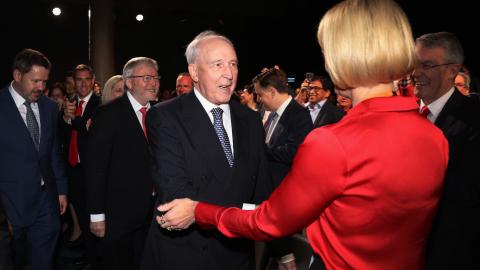Paul Keating argues the Coalition and Labor governments have got the big foreign policy decisions wrong for the best part of a decade.
AUKUS is overreach and we are becoming too reliant on the US at the expense of our own sovereignty. What happens to Taiwan is none of our business, while countering China is futile and dangerous. The former prime minister says we are erring because US retreat into isolationism is possible and Chinese dominance of Asia is probable.
In Australia, Keating is widely panned for these views. Even former Speaker of the US House of Representatives Nancy Pelosi described Keating’s view that Taiwan was “Chinese real estate” as ridiculous and stupid.
But he seems to have found a formidable intellectual ally in Donald Trump. Trump expresses wariness of US military involvement in Asia and Europe. He criticises allies almost as often as he extols alliances. Back in 2018, the second year of Trump’s presidency, Keating praised Trump for having a pragmatic approach to external affairs and noted the latter was surprisingly good at foreign policy.
Will a second-term Trump presidency make Keating’s views more relevant, prescient and even visionary? Not really. Keating and his supporters will be disappointed if that is what they’re hoping. Peer more forensically into the Trumpian world view and it is not at all like Keating’s. Indeed, their reasoning and objectives are diametrically opposed in fundamental respects.
The best way to point this out is to remember the distinction between means and ends. Trump and experts who are likely to be appointed to senior positions if he wins in November have questioned why the US should defend Taiwan. Isn’t that what Keating said as well, at least regarding allies such as Australia? Maybe so, but their respective reasoning processes are all important.
For Keating, it is not just that resistance against China is hopeless. Remember, Taiwan is “Chinese real estate”. For Trump, his rhetoric can be confusing, nasty and inflammatory. But push through that and assessing him on what he has done and is indicating he will do reveals a different position. Trump and his key advisers do not consider Taiwan as belonging to China. Neither do they believe a Chinese victory is inevitable, and that the People’s Liberation Army is undeterrable – core Keating assumptions.
Trump begins and ends in a different place. In conversations with Trump’s key advisers and likely national security cabinet picks over the past 18 months, they have said similar things to me, albeit in different ways.
If Taiwan wants Washington to put American lives in danger to preserve its autonomy, then Taipei must become more responsible and accept a greater burden for its own security and resilience.
This audit will occur for all allies, and the greater the expectation allies have of the US, the greater their burden ought to be. What does this audit look like? These are the key questions.
How much are they spending on defence as a proportion of GDP? What are they spending that money on, and when? Future promises for the end of his decade and beyond will count for little. How prepared are they to fight and resist? And when it comes to fighting alongside Americans, what scenarios are they prepared for and committing to?
The point is that Trump’s position is pragmatic, but not in the way Keating frames it. Both recognise uncontested US pre-eminence in Asia is over. After this point they diverge.
For Keating, this means we may as well give up because China will invariably win. For example, he characterised Australia acquiring nuclear-powered submarines as “throwing toothpicks at the mountain”.
But for Trump it means allies must accept more risk and cost to protect their own security and sovereignty from Chinese coercion and imposition. Otherwise it is unfair and precarious for an overburdened America to fulfil promises that were made to allies in a very different strategic environment decades ago.
For Trump, the American-led alliance system will remain effective only if what he believes is free-riding by them ceases.
This brings us to issues such as AUKUS and the deepening of the alliance. Keating and Trump could not be more different. The former wants Australia, and presumably other Asian allies, to downgrade the alliance and pursue a more independent foreign policy. This will all but guarantee the impotence and gradual unravelling of the US-led security system – which is Keating’s end goal. In contrast, Trump is arm-twisting and cajoling allies to do more to support the presence of American forces and bulk up their own.
The end goal is the strengthening of the US-led security system. This is why Keating detests AUKUS, while Trump will opportunistically use the agreement to put additional pressure on Australia to make good on our promises.
What about the respective approaches to China? It is difficult to imagine Keating supporting the even more expansive tariffs against Chinese imports and restrictions on American capital and technology into China that will occur if Trump wins office again.
Trump’s language is that China is cheating and must pay the price. His national security cabinet will frame it more broadly as doing what it takes to ensure the US remains the most advanced and capable economy and military power in the world. This is at odds with Keating’s predicted and desired end state. Far from finding an intellectual and policy buddy in Trump and his cohorts, Keating and those agreeing with him will find much more to complain about in a victory by the Republicans.
Enjoyed this article? Subscribe to Hudson’s newsletters to stay up to date with our latest content.



















